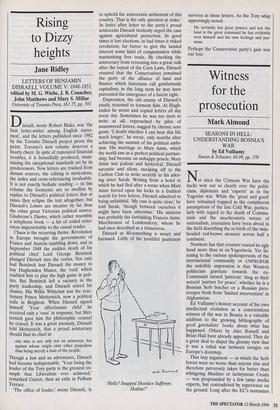Witness for the prosecution
Mark Almond
SEASONS IN HELL: UNDERSTANDING BOSNIA'S WAR by Ed Vulliamy Simon & Schuster, f6.99, pp. 370 Not since the Crimean War have the hacks won out so clearly over the politi- cians, diplomats and 'experts' as in the Yugoslav war. While the 'great and good' have remained trapped in the complacent assumptions of the late Cold War, particu- larly with regard to the death of Commu- nism and the anachronistic nature of nationalism, journalists have been about in the field describing the re-birth of the twin- headed red-brown monster across half a continent.
Nowhere has that creature reared its ugly head more than in ex-Yugoslavia. Yet lis- tening to the various spokespersons of the international community or UNPROFOR the indelible impression is that Western politicians gravitate towards the ex- Communist turned 'patriotic' thug as their natural 'partner for peace', whether he is a Bosnian Serb butcher or a Russian para- trooper fresh from 'limited intervention' in Afghanistan.
Ed Vulliamy's honest account of his own intellectual evolution as a conscientious witness of the war in Bosnia is a valuable addition to the growing bibliography of good journalists' books about what has happened. Others by Alec Russell and Brian Hall have already appeared. They do a great deal to dispel the gloomy view that it was a tribal war between savages on Europe's doorstep.
That lazy argument — in which the Serb forces were no worse than anyone else and therefore perversely taken for better than whingeing Muslims or lachrymose Croats — was propounded by a few tame media experts, but contradicted by experience on the ground. Long after the EC's statesmen and mediators continued to equate victim and aggressor as an essential feature of their farcical 'peace process' (the only ben- eficiaries of which were the hoteliers and numbered bank accounts of Geneva), jour- nalists who had gone out to ex-Yugoslavia with the vague knowledge that the Croats had all been fascists in the second world war and the Muslims were ripe for an aya- tollah were coming to terms with reality.
It does not require a rosy view of some pre-war Balkan idyll of internecine harmo- ny to see that a small number of highly motivated, largely ex-Communist Serb politicians, generals and gunmen set about creating havoc and forcing people, includ- ing reluctant Serbs, to take sides. Ethnic cleansing was intended not only to drive away undesirable people but to force Serbs to take sides out of fear of facing revenge for crimes committed in their names if the Serb armies lost.
Ed Vulliamy is best known for being among the first journalists into the Serb `concentration camps' in the summer of 1992. It turned out that international aid agencies knew about them — as the Red Cross had known about Nazi crimes — but chose to keep the embarrassing news quiet until the journalists raised the alarm. Vulliamy rightly opts now for the term `concentration camps' which he and others fought shy of in 1992 in case they seemed to put conditions on a par with 'death camps' like Auschwitz. They were not industrialised killing centres, merely places of detention, brutality, malnutrition and murder. For most of us that would seem bad enough.
Vulliamy's book is another valuable description of how an imperfect but viable modus vivendi among Balkan peoples was shattered not by nationalist secessionists but by Serb centralists. Of course, others are already learning to put that model into practice, as Vulliamy's account of Croat- Muslim fighting around Mostar shows. Bringing in Russian paratroops may not change the fact that the world has been taught a grim lesson of what is possible in the new Europe.
Mark Almond's Europe's Backyard War will be published by Heinemann in June.



















































 Previous page
Previous page